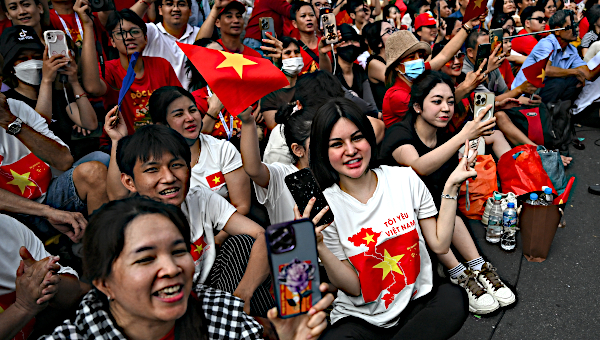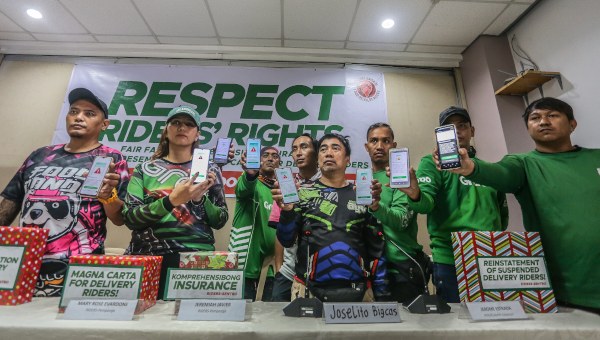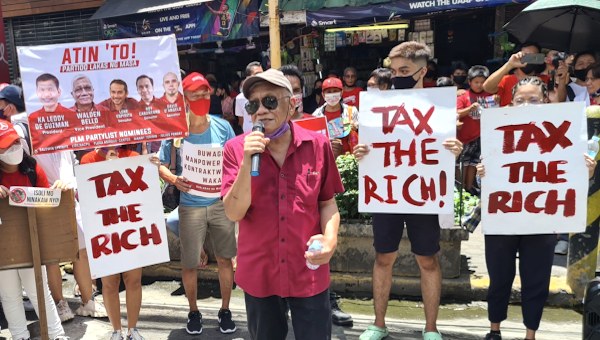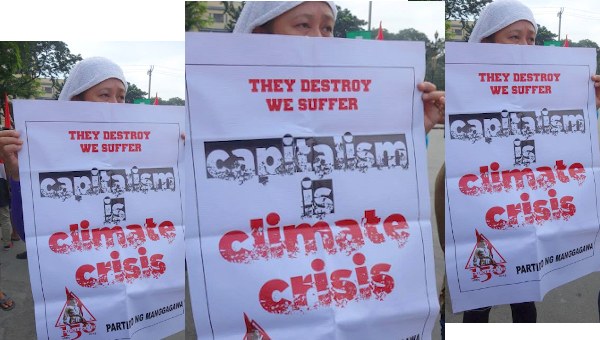A State of Terror: The Death of Human Rights in the Philippines
“We continue to work because of hope for freedom, and trust in the capacity of the people to unite and change the system of oppression” — Congressman Neri Colmenares of BAYAN-MUNA.
The Philippines is second only to Colombia for being the most dangerous place in the world for union activists. From January 2001 to October 2009, there have been 1,118 extrajudicial killings, 204 enforced disappearances, 1,026 people tortured, 1,946 illegal arrests, and 255 political prisoners jailed under trumped up charges.1 In 2006, at the height of the killings, a total of 220 murders took place – an average of twice a week. Every other day grassroots organizations were receiving word that yet another comrade had been brutally murdered; these were people they knew, with whom they worked and struggled. It was at this time that the Filipino activist community, including the families of victims and parliamentarian allies, began to scream out against the blatant disregard for human and labour rights at the hands of their government and initiated an ongoing call for international solidarity. This call prompted investigations by the United Nations both in 2006 and 2007. The results of which indicated that the Armed Forces of the Philippines (AFP) are often directly, if not in some way, implicated in these deaths and other human rights violations.
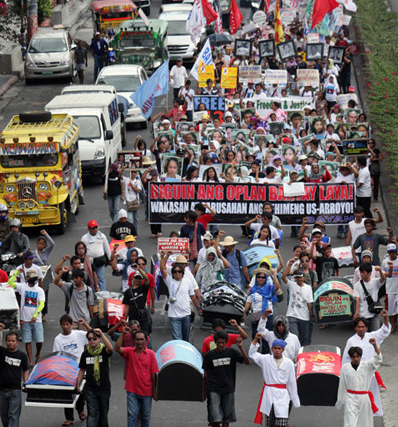
A War Against the People Through State Violence
Gloria Macapagal-Arroyo (GMA) has managed to accumulate more wealth than any Filipino President in history. She was educated in the U.S. and is worth a declared $188-million (U.S.), although she is said to actually be worth much more due to the ownership of properties in the U.S. and money laundered through a business in Hong Kong. During a state address she announced her intent to “neutralize (read: physically eliminate) the social support system of the armed rebel movement” in the Philippines. The armed rebel movement that she was referring to is the New People’s Army (NPA) that has taken up armed resistance in the countryside. However, according to the trail of bodies that have surfaced following that statement, the “social support system” refers to activists and critics of the anti-people politics of the GMA government. This includes progressive social organizations run by unarmed civilians such as labour organizers, union leaders, teachers, lawyers, human rights activists, women’s groups, peasant groups, indigenous groups, journalists, and so on. There is no distinction made between armed combatants and unarmed civilians; if you are vocal in your resistance, you are targeted and charged with the accusation of being a member of the NPA or that the organization that you belong to is a communist front for the NPA.
Under the OBL policies, Macapagal-Arroyo’s regime has effectively sanctioned the Cold War mentality of persecuting “Communists” as enemies of the state. Furthermore, family members of activists are now being targeted and killed. What is perhaps most shocking is that no-one is spared – children, youth, and whole families have been among the dead. This occurs in an atmosphere of impunity as not a single conviction has been made in relation to any of these atrocities. In fact, the notorious General Jovito Palparan has been doing his job so well that GMA actually promoted him to congressman. Instead of being in prison, he is sitting in congress. In the activist community he is known as “the Butcher” because wherever he goes the killings intensify in a hit list-like fashion.
In addition to physical state violence the “legally” offensive strategy is to repress political opponents and socially progressive organizations, which, according to OBL, can be categorized as enemies of the state. The Inter-Agency Legal Action Group (IALAG) was constructed by the GMA government in order to investigate, track, and prosecute legal cases falling under OBL that are classified as matters of national security. However, what the IALAG seems to actually specialize in is the prosecution of national and regional union and human rights leaders under trumped up charges. The most common appear to be possession of drugs and/or weapons, murder, kidnapping, arson and libel. It is not unusual for organizers to be arrested by police, searched and jailed for months on end without due process. Also, charges can be filed against a single individual or a group of up to 100 people. A recent example of this was the mass arrest of 43 health workers (the Marong 43) accused of having ties to the NPA and who are still in custody at the time of this writing.
Labour Rights are Human Rights
In an effort to protect its own, as well as foreign, ruling class interests the GMA government has implemented anti-people/anti-labour legislation, which is viciously enforced through paramilitary forces, corporatized private armies, and the government’s use of the AFP and Philippines National Police (PNP). September 2005 marked the revival of a “no permit/no rally” law, originally enacted in 1985 by Marcos, coupled with what is called the Calibrated Pre-emptive Response (CPR). This official response protocol permits the violent dispersal of peaceful protests, including picket lines, which is a clear violation of the UN’s human right to associate. In these dispersals the use of water cannons, smoke bombs, physical attacks with night sticks and police shields is common. Another frightening piece of legislation is what is called the “Assumption of Jurisdiction,” which is similar to back-to-work legislation and allows for violent means to be implemented by the AFP and PNP. A tragic example of how this particular piece of legislation plays out on the ground is the Hacienda Luisita Massacre of 2004. The Hacienda is a sugar cane plantation spanning about 15,000 acres and owned by the Cojuangco family. The workers went on strike demanding better working hours and a living wage. The workers were peaceful in their protest; however, they refused to move from their picket line. On the third day of the strike, when the usual intimidation tactics and violent actions failed at dispersing the crowd of workers, the PNP opened fire killing seven people. Far more insidious is that, not only were seven workers shot on the front lines of the strike, seven more were assassinated in the months that followed the incident. These were clearly strategic killings in that those who were targeted were key labour organizers at the Hacienda, where workers continue to live and labour.
Workers within the Export Processing Zones (EPZs) of Cavite also face extreme violence in their organizing efforts against atrocious working conditions. EPZs are guarded by the private security of multinational corporations who adopt a strict “no union/no strike” policy from countries such as China, Korea, and the USA. They are predominantly filled with subcontractors that work for such big brand names as Honda, DKNY, and Bridgestone, as well as suppliers for Ralph Lauren, Wal-Mart, American Eagle and the GAP. Shifts are a minimum of 16 hours, six days a week and can be as long as 24 hours as many of these workers fail to make minimum wage or even half. Those who even attempt to form a union are met with beatings on site, some have been abducted, hog-tied, blindfolded, and thrown out of vans; others have experienced attempts on their life and some have actually been shot and killed. Filipino workers are fighting for much of the same things as workers in Canada and around the world – job security, the end of contracted labour and outsourcing of jobs, access to healthcare benefits, and a living wage.
Massacres in a Culture of Impunity
The Ampatuan Massacre is the most recent mass killing in the Philippines to receive international attention. On the morning of November 23, 2009 in Maguindanao province located in Southern Mindanao, 57 unarmed civilians were brutally gunned down by 100 men consisting of members of the Civilian Armed Forces Unit and the Civilian Volunteers Organization, these groups having clear links to both the Philippine Army (PA) and PNP. These men were apparently led by the son of the head of the Ampatuan clan. Among the victims were over 30 journalists along with two female public interest lawyers, and relatives of the Vice-mayor Datu Mangudadatu. The group was traveling to register their candidacy in the upcoming May 2010 elections, which would have allowed the Vice-mayor to run as an opposition candidate against the Ampatuan clan member currently in power. None of the 100 gunmen involved in this mass murder have been arrested.
Karapatan, a Human Rights organization in the Philippines has called the Ampatuan Massacre “carnage waiting to happen” due to the nature of OBL and the formation of paramilitary groups, which are part of its counter-insurgency strategy and act as support units of the PA and PNP. There are also very important links to be drawn between the Ampatuans and GMA. The Ampatuans, a ruling family in the Philippines, were alleged to have provided GMA with the fraudulent votes needed to steal the election in 2007. This incident is indicative of not only dangers that face many electoral candidates running against the ruling party but, and this reaches far beyond election time, of the lengths those currently in power will go to in order to retain absolute authority.
U.S. and Canadian Imperialism in the Philippines
The GMA government supports the war on terror, as well as the invasion and military occupation in Iraq and Afghanistan by the U.S. and Canada. In addition to the implementation of OBL, in July 2007 the GMA government passed the Anti-Terrorism Law (ATL), or what has been dubbed the “Human Security Act.” This law closely resembles the U.S. Patriot Act and was enthusiastically supported by the Bush administration, which meant it was also a high priority for GMA. This law is what makes the arrest and indefinite detention of activists and organizers without due process, labelled as “suspected terrorists,” permissible under the guise of national security. After the ATL was passed, the Bush administration increased military aid to the Philippines, his “major non-NATO ally,” by 1600 percent in 2008 compared with 2001. As a result, no other country in the East Asia-Pacific region receives more military funding than the Philippines, ranking it the 3rd country in the world in terms of receiving additional funding specifically for the training and education of its military. It is perhaps, then, no coincidence that the GMA government has been most aggressive in the repression of resistance groups in the Southern Philippines province of Mindanao, where the U.S. has expressed the most economic interest due to the presence of oil and natural gas. The Obama administration continues to provide the Philippines with its sizeable “foreign aid.”
The U.S. has increased its military presence in the Philippines through “joint military exercise” training programs such as the U.S. Joint Special Operations Task Force – Philippines (JSOTF-P). Filipino human rights organizations have obtained evidence and suspect that U.S. troops are involved in more than training exercises such as assisting the AFP in combat operations against indigenous groups in the region struggling for self-determination. Canada also has RCMP officers located in the Philippines and operating through the Canadian Military Training and Assistance Program (MTAP) and the Police Training and Assistance Program (PTAP).
The neoliberal policies put forth by the GMA government have also cleared the path for multi-national corporations to extract wealth from the country. The Philippines is immensely rich in minerals and fertile land, which has attracted huge mining and agro-industrial projects by foreign companies, including from Canada. The GMA government’s pandering to such foreign capital interests has driven the country into tremendous foreign debt ($54-billion (U.S.) in 2006). This has resulted in massive cuts to social spending particularly in healthcare and education. Public-private-partnerships between multi-national corporations and universities, for example, have been pushed by the GMA government as a solution, as well as total privatization measures targeting the National Power Corporation, the National Food Authority, as well as the Polomolok and Davao water districts. Onerous taxes are also pushed: for every Philippine $10 (PHP) collected in taxes, $6 (PHP) goes to the foreign debt repayment of predominantly American and Japanese commercial banks, as well as international lending institutions such as the World Bank.
For its part, Canada is the biggest importer of Filipino foreign labour through the Live-In Caregiver Program. There are approximately 400,000 Filipinos living in Canada, 45 percent of whom are temporary workers. The migration of about 3,000 Overseas Foreign Workers (OFWs) out of the Philippines everyday, 80 percent of whom are women, amounts to about 1,000,000 annually. OFWs are arguably what keep the Philippines economically afloat. The influx of foreign capital into the country in the form of remittances alone from OFWs is roughly $14 to $15-billion (U.S.), which accounts for nearly 15 percent of the national GDP. This number is set to increase by 6-8 percent this year. As such, this practice of shipping people as export labour out of the country is highly encouraged and fiercely protected by the government. Even though the bulk of this money does not go directly to the government, but to the families of OFWs, it inflates the GDP which the government then uses as collateral to borrow more money.
Considering Canada’s dependence on Filipino foreign labour, as well as Canadian mining activity occurring in the Philippines, it is perhaps not surprising, although not any less disturbing, that Canada does not appear to have done much to stop the corrupt practices of the GMA government or the killing of Filipino activists. In fact, the Canadian government has maintained a stance of diplomatic silence on the subject. Nor does Canada recognize people who flee the Philippines as political refugees. Also, according to a media fact sheet released by CUPE National, there is additional Canadian involvement in the Philippines through Economic Development Canada (EDC), which has provided roughly $120-million (CAN) in loans to fund Canadian companies in the Philippines, as well as involvement in the Counter Terrorism Capacity Building (CBRN) of the Philippines government.
Grassroots Resistance and International Solidarity:
Both Parts of the Struggle
The struggle against privatization, labour exploitation, and the move toward genuine land reform and social change in the Philippines is one of subsistence and survival. The violence that organizers are met with touches the Filipino activist community and their loved ones in very tangible, tragic, and immediate ways. Due to the urgency and danger of the situation, resistance at the local level has become highly coordinated. Bringing together the resistance efforts of several social organizations and activists is not without conflict; however, the basis of unity is simple – an engagement in the struggle for freedom from oppression and for genuine democracy, which emphasizes the mass movement of the people as anti-imperialist, anti-fascist, and a broad united front. A broad and organized resistance is central both on the ground and in the electoral arena. Human and labour rights organizations in the Philippines support each other and their communities by providing strike support, mobilizing and coordinating organizations in calls for action in order to pool efforts for demonstrations, protests, and relief work. They also support progressive candidates in local municipal and federal elections and organize educationals.
International solidarity is also emphasized in order to garner international pressure on the Filipino government to stop state violence. In order to call attention to ever-increasing state violence that is occurring both in connection to the end of OBL Phase 2 and the breakdown of the democratic process in the presidential elections, observers from Canada, U.S., UK, Germany, France, Taiwan, Australia, and New Zealand are traveling to the Philippines at the request of numerous human and labour rights organizations. This People’s International Mission is being organized in part by concerned groups and individuals in the Philippines, including Pagbabago, the People’s Movement for Change.
The possibility of a fraudulent election has many people worried. In particular, the introduction of an automated ballot system at the national level and a history of electoral fraud in past elections, including GMA’s assumption of presidency in 2007, informs such concerns. Furthermore, GMA may have a few more tricks up her sleeve in order to retain political power and avoid the numerous charges of corruption and human rights abuses that await her as soon as she steps down, including attempts at changing the charter in a way that would allow her to run for a seat in congress after her term, or calling national martial law in the event that elections fail. While the upcoming elections in May could possibly entail a change in guard of the GMA regime, this by no means ensures that the organized violence and struggles of Filipinos is over. There is much hope that the next administration will be more attentive to the needs and well-being of marginalized groups and the urban poor. However, this has yet to be seen. And we all know how enticing ‘hope’ can be. •
Endnotes
- Source: Karapatan 2009 Report on the Human Rights situation in the Philippines.


